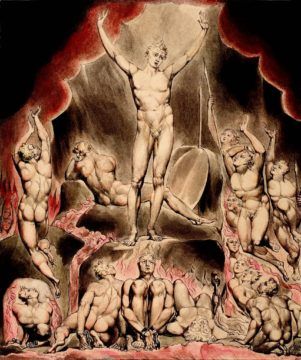Lauren Christensen in The New York Times:
 When the Restoration ended his career in Britain’s Commonwealth government in 1660, John Milton turned his full attention to the verse tragedy he’d started around 1640, then called “Adam Unparadised.” By now in his 50s, blind and ailing, Milton composed “Paradise Lost” aloud, in bed or (per witnesses) “leaning backward obliquely in an easy chair, with his leg flung over the elbow of it,” memorizing the stanzas to be transcribed in another’s hand.
When the Restoration ended his career in Britain’s Commonwealth government in 1660, John Milton turned his full attention to the verse tragedy he’d started around 1640, then called “Adam Unparadised.” By now in his 50s, blind and ailing, Milton composed “Paradise Lost” aloud, in bed or (per witnesses) “leaning backward obliquely in an easy chair, with his leg flung over the elbow of it,” memorizing the stanzas to be transcribed in another’s hand.
Of the resulting 10,000-line manuscript he sent to the Stationers’ Company in London in 1665, only 798 lines survive. These 33 pages correspond to Book 1 of 10 in the first, 1667 edition; a second edition, in 1674, would regroup the poem into 12 books. In the penmanship of a single, professional scribe, the pages are almost certainly a fair copy: a final, corrected version compiling the rough drafts that, in Milton’s case, would have borne the distinct markings of his various amanuenses, as they received his dictations.
More here.
